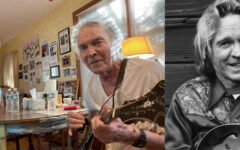
Bluegrass 45 Reunion at the 2017 IBMA Wide Open Bluegrass festival – photo by Frank Baker
It’s a well established fact that the Japanese have long been avowed fans of American music. Akira Otsuka can attest to that firsthand. Born in Japan and currently living in Maryland, he fronts a band called Bluegrass 45, a revered internationally-known outfit that’s successfully maintained its ongoing trajectory for over 55 years.
“Japanese people appreciate all kinds of culture,” Otsuka insists. “It can be history, geography, lifestyle, food, movies, paintings, sculpture, pottery, and music. You find classical, jazz, reggae, rock, Hawaiian, country, latin, and bluegrass on the radio, on CD, through online streaming, at music stores, and at concerts.”
He cites as one particular example an annual Japanese bluegrass festival that’s been in existence since 1972. Every summer, the event draws approximately 120 bands from throughout Japan and sometimes even as far away as the United States.
Otsuka’s own interest in the idiom was spawned from his older siblings. His family had a very wide cultural perspective, given that his father was stationed in Shanghai prior to World War II. While there, he worked with people of English, French, and Chinese origin, driving a Ford by day and often going to dances at night.
“When we were growing up, my older sister Hideko was listening to Elvis, and my oldest brother Hiroshi used to listen to a lot of jazz, especially Dave Brubeck,” he recalls. “When my next brother, Yutaka, entered college, he bought a guitar, joined a country band, and started singing songs by people like Hank Williams and Hank Snow. When he became a sophomore, the country band disbanded, so he decided to form a bluegrass band since he was listening to bluegrass bands from the area.”
His other brother Tsuyoshi had been playing violin since elementary school, but when he began listening to bluegrass like his brother, he switched to banjo. Akira was handed a mandolin, and soon after the Otsuka boys formed a trio featuring guitar, banjo and mandolin.
“Our first influences included Bill Monroe, Lester Flatt & Earl Scruggs, Stanley Brothers, and Reno & Smiley,” Otsuka says. “A few years later we started listening to more urban sounding bands like Country Gentlemen, Dillards, and Greenbrier Boys.”
Nevertheless, their influences were culled carefully. There was no internet, DVD, YouTube, or even an instructional books for ready references. “LPs were expensive, especially imported LPs,” Osaka recalls, “We didn’t want to scratch the LPs, so we used to tape them to open reel tapes and slow down to half speed so we could copy the notes.”
Regardless, the timing was right. It was the mid ‘60s, the height of the folk boom both at home and abroad.
“There were concerts almost every other week somewhere nearby and they featured modern folk groups, in the style of the Brothers Four, Kingston Trio, and Peter, Paul and Mary style, and country bands singing Hank Williams, Buck Owens, and Kitty Wells songs, as well bluegrass bands,” Otsuka remembers. “These concerts were held in large halls and they were well attended. Most of the bands were made up of college students, and the bands helped with the ticket sales. The audiences were generally well-educated, since many of them were friends of the bands.”
Eventually the brothers expanded their ranks and adopted a new name, Bluegrass 45, taken from the song Train 45, the Colt 45 pistol, and 1945, the year Lester Flatt and Earl Scruggs joined Bill Monroe’s Blue Grass Boys and defined a genre. The group toured the States for three months in 1971 and four months the following year. “We had a base camp in Washington, DC and even played at the Grand Ole Opry,” Otsuka recalls. “We performed festivals and venues in Maryland, Pennsylvania, New Jersey, Kentucky, Indiana, Rhode Island, Toronto, Virginia, North Carolina, and Georgia. We were an opening act for Conway Twitty and Lorretta Lynn for a ten day tour. In September 1971 at the Richmond Coliseum in Virginia, Roy Acuff, Conway Twitty, Bluegrass 45, and Merle Haggard played, in that order, then that night we opened up for Jerry Lee Lewis in Alexandria, VA.”
Bluegrass 45‘s recorded legacy began with a self-produced album, Run Mountain, in 1969. It was shortly after that that Dick Freeland, then owner of Rebel Records, heard the record, saw the group perform in Osaka, and subsequently invited them to come to the States for that first U.S. tour. He offered the band a record contract, and they went on to release three albums for his label. An earthquake that hit their home disrupted their progress in 1995, but they managed to do another tour in 1996 and subsequently released a live CD to cap their recorded output.
These days, Otsuka lives in the States and busies himself with his own projects, while the rest of the band remains in Japan. However they still get together for occasional reunions, including a 50th anniversary tour that took place in 2017. In addition, over the past four years, a film crew from Nashville has been following the group and there’s hope the footage will eventually emerge as a full length documentary about the band.
Consequently, when asked why he believes bluegrass boasts such universal appeal, Otsuka can offer his own personal perspective.
“It’s funny you asked that question,” he says. “Bluegrass is an American art form and I’m Japanese. But, it’s much bigger than that. Bluegrass is loved by coal miners in Kentucky and West Virginia, a left-wing hippie in San Francisco, 10 year-old farm helpers in the Ozarks, right-wing NRA lawyers in Washington DC, moonshiners in North Carolina, Irish Fishermen, banjo makers in Czechia, businessmen in Tokyo, woodmen in Alaska, Korean high school students, and French chefs. It’s a very wide range of people representing different age groups, political viewpoints, and demographical distances.”
Bluegrass 45 provides the proof.







